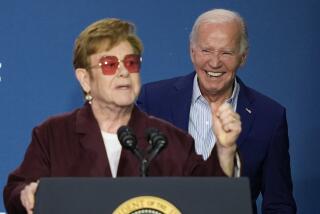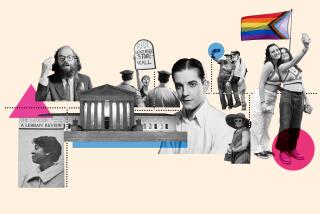Clinton and Gays Hold Historic Meeting : Prejudice: Activists, in unprecedented Oval Office session, hear President’s renewed commitment to fight bias against homosexuals.
- Share via
WASHINGTON — For the first time, gay activists and a President met Friday in the Oval Office, with President Clinton reaffirming his commitment to fight prejudice against homosexuals.
In a one-hour afternoon meeting, Clinton said that he would take part in some manner, although not in person, in the gay-rights march scheduled April 25 in Washington. He repeated his intention to lift the official ban on gays in the military services, promised to name a government official soon to head the fight against AIDS and said he generally supports the idea of federal legislation to bar discrimination against homosexuals.
The meeting came amid tensions between the gay rights activists and Clinton over his intentions on the issue of gays in the military and over his participation in the march. Those who attended described the private session as warm and the occasion as historic.
“This meeting symbolized the entry of lesbian and gay people into the mainstream of American life,” Thomas B. Stoddard, of the Campaign for Military Service, told reporters as the meeting ended. While 20 years ago such a session would have been “inconceivable,” now “we are part of the American family. And this President has made that happen.”
In recent days some activists have spoken out publicly about their desire for Clinton to appear in the march to show dramatic support for a cause he espoused during the 1992 campaign. Clinton said this week, five months after the invitation was offered, that he was spending Sunday in Boston to address the Newspaper Assn. of America and could not attend.
But Friday, in remarks following a meeting with Japanese Prime Minister Kiichi Miyazawa, Clinton insisted that he intended no harm.
“I meant no snub,” he said. “But presidents don’t participate in marches.” The decision “has nothing to do with my commitment on the fundamental issue of being anti-discrimination,” he said.
“I have, I believe it’s clear, taken a stronger position against discrimination than any of my predecessors,” Clinton said. “And it is a position that I believe in deeply, one that I took publicly before there was any organized political support for me in the gay community.”
The gay activists, including some who have strongly urged the President to take part in an event that they have described as a turning point in their cause, seemed satisfied by his promises.
“It was very clear from this meeting that, while President Clinton may be in Boston on Sunday, his soul will be in the march on Washington,” said Torie Osborn, executive director of the National Gay and Lesbian Task Force.
She said that Clinton “is a man who is clearly very comfortable with diversity and comfortable with gay and lesbian people.” The session included some laughter, over the idea “that this is indeed the Gay Nineties,” Osborn said.
Billy Hileman, a co-chairman of the march, said that Clinton also expressed his support for the idea that Hileman is an openly gay teacher. “He said very supportive things about my profession and people who are gay,” said Hileman, a high school science teacher from Pittsburgh, Pa.
Clinton also gave the group some political advice. He recommended that--to make the most persuasive case to the American public--they should emphasize real-life stories of homosexuals who have suffered through discrimination. Such examples had often worked for him in his career, he told them.
Clinton told the group that he hopes to name the AIDS official in about a week to coordinate government AIDS research and efforts to fight the disease. He promised that the AIDS funding in his planned economic stimulus package is not negotiable with Congress, the activists said.
Earlier Friday, senior members of Clinton’s health care task force met with AIDS health care providers and others to discuss provisions for AIDS patients in the national health plan. Top officials of the task force, including White House officials Ira Magaziner and Carol Rasco, said that the basic health-services plan would include provisions for prescription drugs, home and outpatient health care and access to specialist care of kinds needed by AIDS patients.
The group promised that the task force will recommend universal access to health care, although officials said they could offer no promises about how long it would take to provide that access, according to Leonard Bloom, chief executive of AIDS Project Los Angeles, an AIDS services provider.
More to Read
Get the L.A. Times Politics newsletter
Deeply reported insights into legislation, politics and policy from Sacramento, Washington and beyond. In your inbox twice per week.
You may occasionally receive promotional content from the Los Angeles Times.










